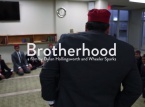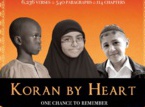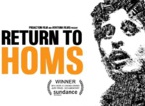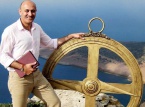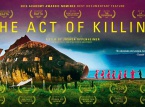Tags (7) : documentary
America’s first Muslim-American fraternity is hitting the big screen. Alif Laam Meem, also known as Alpha Lambda Mu or simply ALM, has ridden a wave of national media attention to since its founding in 2013. Now, filmmakers Dylan Hollingsworth and Wheeler Sparks are out to make a documentary that they say will “explore the Muslim American identity, as well as the challenges of living by faith in a secular society.” The film is tentatively titled “Brotherhood: America’s Favorite Muslim Fraternity” and set to be released in 2015. (Huffington Post)
Le documentaire italien "Io Sto con la Sposa" (Du côté de la mariée) suit le périple de cinq réfugiés syriens, qui mettent un scène un faux mariage pour traverser l’Europe sans encombre et atteindre leur terre promise : la Suède.
The documentary film, “Koran by Heart” follows the progress of three scholars, a girl and two boys, all 10 years old, as they compete in Cairo against students who, in some instances, are nearly twice their age in the annual International Holy Koran Competition. Directed by Greg Barker (HBO) the film captures touching moments of the three children at home with their families, where they open up about life and religion, academic dreams and career aspirations.
History Channel - Muhammad The Prophet is a nice Documentary made by History Channel. It provides a brief Biography for the Prophet of Islam Muhammad (Peace be upon him).
Documentary, Director : Talal Derki, 2013, Syria-Germany, 88 mn.
The film also premiered in-competition in the World Cinema Documentary Competition at 2014 Sundance Film Festival on January 20, 2014. It won the Grand Jury Prize award at the festival. The movie is about the Syrian citizen who challenged everything and everyone to demand freedom. It’s a movie about war and the pressure of being in a battlefield.
The film also premiered in-competition in the World Cinema Documentary Competition at 2014 Sundance Film Festival on January 20, 2014. It won the Grand Jury Prize award at the festival. The movie is about the Syrian citizen who challenged everything and everyone to demand freedom. It’s a movie about war and the pressure of being in a battlefield.
Physicist Jim Al-Khalili travels through Syria, Iran, Tunisia and Spain to tell the story of the great leap in scientific knowledge that took place in the Islamic world between the 8th and 14th centuries.
Its legacy is tangible, with terms like algebra, algorithm and alkali all being Arabic in origin and at the very heart of modern science - there would be no modern mathematics or physics without algebra, no computers without algorithms and no chemistry without alkalis.
Its legacy is tangible, with terms like algebra, algorithm and alkali all being Arabic in origin and at the very heart of modern science - there would be no modern mathematics or physics without algebra, no computers without algorithms and no chemistry without alkalis.
Documentaire, 2012, Danemark/Norvège/Royaume-Uni, un film de Joshua Oppenheimer
Synopsis (wikipédia) : Le film évoque le mouvement du 30 septembre 1965 en Indonésie ainsi que les massacres qui ont suivi, et qui ont causé la mort de 500 000 à un million de personnes. La parole est donnée aux auteurs de ces massacres, en particulier Anwar Congo et Adi Zulkadry, membres des escadrons de la mort. À lui seul, Anwar Congo a assassiné environ 1 000 personnes, généralement en les étranglant avec un câble. Il est aujourd'hui un des fondateurs du groupe paramilitaire d'extrême droite indonésien Pemuda Pancasila, et n'a jamais été inquiété pour ses crimes. Lorsqu'ils y sont invités par le réalisateur, Anwar et ses amis reconstituent volontiers les tueries pour les caméras, où ils évoquent leurs souvenirs et leurs sentiments. Les scènes sont reproduites dans le style de leurs films favoris : film de gangster, western et film musical. Certains des amis d'Anwar admettent devant la caméra qu'ils ont mal agi. D'autres s'inquiètent plutôt des conséquences du film sur leur image publique.
Synopsis (wikipédia) : Le film évoque le mouvement du 30 septembre 1965 en Indonésie ainsi que les massacres qui ont suivi, et qui ont causé la mort de 500 000 à un million de personnes. La parole est donnée aux auteurs de ces massacres, en particulier Anwar Congo et Adi Zulkadry, membres des escadrons de la mort. À lui seul, Anwar Congo a assassiné environ 1 000 personnes, généralement en les étranglant avec un câble. Il est aujourd'hui un des fondateurs du groupe paramilitaire d'extrême droite indonésien Pemuda Pancasila, et n'a jamais été inquiété pour ses crimes. Lorsqu'ils y sont invités par le réalisateur, Anwar et ses amis reconstituent volontiers les tueries pour les caméras, où ils évoquent leurs souvenirs et leurs sentiments. Les scènes sont reproduites dans le style de leurs films favoris : film de gangster, western et film musical. Certains des amis d'Anwar admettent devant la caméra qu'ils ont mal agi. D'autres s'inquiètent plutôt des conséquences du film sur leur image publique.
|
Les Cahiers de l'Islam © 2012-2023. Tous droits réservés.
ISSN 2269-1995 Contact : redaction (at) lescahiersdelislam.fr |


